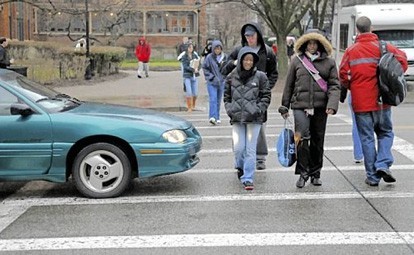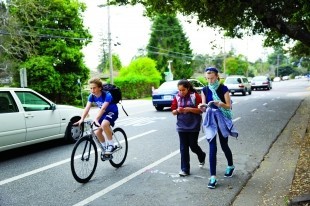Distracted Pedestrians are a National Epidemic
Distracted Pedestrians are a National Epidemic
A woman was checking her cell phone for the nearest bus stop in a crowded city. She became confused and realized she was standing on the wrong corner and saw her bus about to leave across the street. On impulse she dashed towards the bus, waving her arms while only focused on trying to get the bus driver’s attention. She did not even turn to look as another oncoming vehicle approached her left side. This could have been a fatal mistake but thanks to the quick reaction of the car’s driver, she escaped harm, but was shaken and full of remorse for her lack of foresight.
This type of thing happens too often in this country, and in many cases, it’s the pedestrian’s fault. We automatically assume it’s the driver’s fault, but almost 1/3 of the time, it’s the pedestrian who caused the accident. At California Auto Center in La Habra, CA, we want pedestrians and drivers to work together, to make our city safer for all its residents.
Blame those Personal Electronic Devices
We’ve all heard about accidents caused by distracted driving, but according to a study by Ohio State University, the number of pedestrian accidents is also on the rise. The habit of having constant contact on our personal devices makes it too easy to pull out the phone while walking, which causes us to shut down our awareness of our surroundings. Several college campuses have taken action to prevent pedestrian accidents by launching pedestrian safety campaigns.

Teens & Young People Are Most Susceptible
A pedestrian by definition is one who travels by foot, stroller or wheelchair. The pedestrians who are most at risk are older adults and children, as well as those who choose to walk while alcohol impaired. Teens and young adults between the ages of 16 and 25 have experienced injuries and fatalities by falling off of walkways, bridges and walking in front of moving traffic while using their cell phones.
Teens are at risk for death from pedestrian-injuries twice the rate of young children. However, that number changes on Halloween when many accidents involve young children who are walking around Trick-or-Treating. Parents can make sure a child’s costume is safe by checking their visibility while wearing a mask or finding an alternate (such as face paint). Hems of costumes on children should be short enough so they don’t trip and fall when crossing the street. And reflective tape can be added to costumes to make them more visible.

Teach Kids by Example
Adults can be extra aware while driving and when preparing youngsters for the road. Teach youngsters to put down their devices and pay attention at cross walks by looking left and right before crossing as well as paying attention to the lights. Increasing pedestrian visibility at night is improved when walkers carry a flashlight or wear retro-reflective clothing. Pedestrians should cross the street at designated crosswalks or intersections and walk on the sidewalk. If there is no sidewalk then walkers should stay on the shoulder of the roadway facing traffic.
Another safety tip is to teach youngsters that it is good to make eye contact with drivers to make sure they are seen before stepping into the street. Drivers should also assume that pedestrians may be distracted and act accordingly. It’s always best to yield to pedestrians even if they are crossing improperly. Drivers should slow down and pedestrians should look up, listen and pay attention.
We are all pedestrians, so please pay attention while you’re walking or running in the streets of your city. When it comes down to cars vs. people, humans are seriously overmatched, so remember that the next time you’re jaywalking or crossing on a red light. Tips courtesy of California Auto Center in La Habra, a body shop who truly cares about its customers and its community.











Social